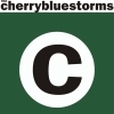Hello, Bluestormers! Yes, we’re continuing our series of interviews with Glen Laughlin. Today we’ll be talking about A Better Place.
W: I know that this song has a sort of dual personality. Can you give us some background?
GL: We live in a world where, much like the world of theatre, the universe abhors a lack of unresolved issues. Whether death is the ultimate resolution of anything is a philosophical issue that we won’t plumb too deeply today, but the song in question does deal with it in the context of life and in the context of BPO.
Deborah learned that a friend had unexpectedly committed suicide. I believe it is rare to actually expect such a thing, but it is surely more surprising in one case than another. This was such a case. The suicide was well-planned. The suicide note was philosophical and seemingly designed to put friends at ease with this most personal decision. Nevertheless, the memory of a friend can never fill the gap that the living being filled. We hope, believers or not, that our friend is in a better place. We celebrate their having passed through, if not their passing on, as they have made ours a better place.
In Penny’s story, the moving on to what promises to be a better place is not presaged by the termination of a life, but the termination of a romantic engagement. Still, similar feelings of loss and guilt mingle with uncertainty and the hope that we too can find ourselves in a better place. In Penny’s case, that meant moving on in a literal way, which ignites our story. Much like the illusion in an old movie, where the subject is stationary and the background is moving, our story focuses on Penny, giving the impression that she is moving through the story. It seems to me that the background is as much the star of this play as Penny and it moves past her as it did the rest of our generation, as each of us acted out our own stories in front of it.
W: I think that is one of the things I like most about BPO; the fact that the real action is not necessarily where the focus is. Tell us about the musical aspect.
GL: As you can see, this is a co-write with Deborah. I did write the music, but we collaborated on the lyrical ideas. Deborah had the idea for the lyric and I went right to the piano and banged it out in about five minutes. It is a rather simple song. The arrangement got interesting with the horns. I came up with the horn arrangement and Lily Aycud did a beautiful job executing it. Then, I asked Lily to do a Bachrachesque flugelhorn solo. Her first take was definitely the one, just superb, with just a measure or two from another take at the very end. Then, I took the horns from the chorus, which starts with a B major chord and superimposed them over the E major chord for the coda and I think it worked beautifully. The other magic in the track, other than Deborah’s vocal, were the handclaps. Somehow they really made the flugelhorn solo even better. I’m sure more than one person will have compared the track to The Kinks’ Dead End Street, due to the possibly bleak lyric against the rather happy music. I’m very pleased with how that song turned out.
W: And so are we!
